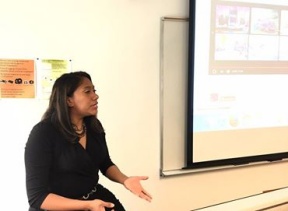
By: Lillian Williams
Only 44 percent of college seniors feel “very prepared” for their careers, according to a recent McGraw-Hill Education workforce survey. The annual survey attempts to reflect a snapshot of the expectations, worries, and views of college students about career readiness. The 5,000-student survey shows:
Yet, the survey cautions that feelings of preparedness vary, depending on a variety of factors. A large portion – 83 percent – of college seniors report feeling at least “moderately prepared.” This group feels best prepared to use their interpersonal skills such as communication abilities and teamwork, rather than technical, presentation and networking skills. And, when asked what could lead them to feel most fulfilled in their careers, the top three answers were:
None of these responses surprise Carolina Cruz, a TV news producer and recent guest speaker on career and other academic-related issues at Columbia College Chicago.“I’ve seen procrastinators wait until their last year to prepare for the job search,” Cruz said. “There are smarter ways to prepare. Ways that put you in a much better position.” Cruz knows from experience how to boost job success in a competitive market. She works in the nation’s third largest market as a TV producer for Univision Chicago.

A 2012 Columbia graduate, Cruz majored in journalism with a concentration in broadcast television. Prior to Univision, she worked at the ABC/FOX affiliate in Rockford, Illinois. In the Tampa, Florida market, she worked at Centro Tampa Newspaper, a Spanish-language publication, and at Bright House Network TV and Entravision TV. At Univision Chicago, she is responsible for monitoring news developments; creating content for the 5 p.m. and 10 p.m. newscasts, and assigning stories to reporters, among other tasks.
“If you want to get a job in any industry, you have to start your search way before your senior year in college,” Cruz said. “That’s the strategy I used. You take steps in college to build a foundation for success in the employment market. Anyone can do this!”
Here’s the plan that Cruz recommends:
INTERNSHIPS: “You should do several internships if possible,” Cruz said. “Do different types of internships so that you find out what works best for you.” Internships continue to benefit students after they leave college, Cruz said. “People I met during my internships were able to advise me later on in my career. They became my mentors.”
That mirrors the experience of Joshua Short, a reporter at WNDU in South Bend who held internships at the ABC and CBS stations in Chicago.
“Internships played a major role in my success both in school and outside of classrooms” Short said. “They give you a chance to apply would you have learned in a classroom setting while simultaneously allowing yourself to learn what only can be learned in the field. Professors, teachers and collegiate staff are great at teaching and informing you about the real world and how things are done. But experiencing it and increasing yourself in a setting is invaluable.”
NETWORKING EVENTS: “I would go to networking events of professional journalism organizations,” Cruz said. “When you go to meetings of professionals in the industry, you meet people who give you advice, and if you make a good impression they will remember you, too.” Cruz is now a board member of the National Association of Hispanic Journalists (NAHJ) Chicago Professional Chapter.
Short said networking makes a big difference: “I would not be where I am today without meeting and greeting with professionals in my field and creating contacts. Keeping in touch with them can be the difference between being jobless, or beginning in a medium market, in terms of journalism.”
SCHOOL GROUPS: “It’s a good move to join school organizations while in college,” Cruz said. “They will be your peers in the industry. You can tell each other about jobs and give each other support. You learn from each other.”
FREELANCE WORK: “Always try to get your work [to be] seen,” Cruz said. “Even while you’re in college, you want to publish your work, have it on the web. You want to collect as much freelance work as you can before you graduate.”
The workforce survey examined other career-related student motivations. Among the findings were:
LILLIAN WILLIAMS is an associate professor in the Communication Department at Columbia College Chicago.









